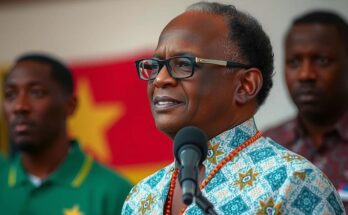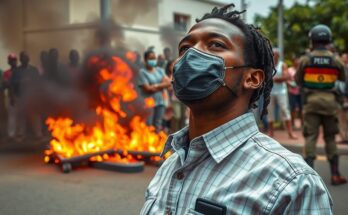Lithuania has begun its parliamentary elections with many voters seeking change, as the current government, led by Prime Minister Ingrida Šimonytė, faces criticism despite economic successes. A poll suggests a potential victory for the opposition Social Democrats, necessitating alliances to form a governing coalition. The elections occur against a backdrop of pandemic fatigue and migration issues, with significant implications for Lithuania’s future governance and foreign relations.
Lithuania has commenced its parliamentary elections, with a significant portion of the electorate expressing a desire for change, despite the nation’s strong economic performance. On Sunday, citizens cast their votes in the opening round of electoral proceedings, which may result in the replacement of the center-right governing coalition led by Prime Minister Ingrida Šimonytė with the opposition Social Democrats alongside smaller center-left parties. The current government, which assumed office in 2020, has faced scrutiny due to stringent COVID-19 protocols and the recent surge in migrant numbers, overshadowing its economic achievements. While Lithuania has experienced remarkable double-digit growth in personal income and maintains one of the lowest inflation rates in the European Union, many voters remain underwhelmed. Rima Urbonaitė, a political analyst at Mykolas Romeris University in Vilnius, articulated the prevailing sentiment: “There’s a lot of disappointment and discontent among voters. It is related to numerous crises and shocks and cannot be compensated by economic factors like positive change in purchasing power.” Critics have accused Šimonytė of inadequate support for businesses during pandemic-induced lockdowns, alongside concerns about healthcare accessibility. Furthermore, the Prime Minister has been criticized for her responses to the influx of migrants from Africa and the Middle East, which some attribute to the orchestrations of neighboring Belarus and Russia. Polls indicate a potential shift in power, with the Social Democratic Party, under the leadership of Vilija Blinkevičiūtė, projected to surpass Šimonytė’s Homeland Union. A newly established party, led by right-wing politician Remigijus Žemaitaitis, is also expected to garner significant votes. However, it is anticipated that no single party will secure more than 20 percent of the vote, necessitating potential alliances to form a ruling coalition. The Social Democrats have explicitly stated they will not ally with Žemaitaitis’ party, implying that smaller, center-oriented parties may have to join forces. The upcoming elections carry greater significance given the intensifying geopolitical tensions surrounding Russia, particularly following the ongoing conflict in Ukraine. Analysts concur that a leftward shift in parliament would unlikely alter Lithuania’s foreign policy, primarily directed by President Gitanas Nauseda, who recently won a second term despite challenges from Šimonytė. Approximately 2.4 million citizens are eligible to elect 141 members to the Seimas for a four-year term, with voting occurring in two rounds. The initial round has seen about 70 members elected from party lists coupled with those from single-mandate districts achieving a majority. The runoff election is scheduled for October 27, effectively narrowing down the contenders for the single-member constituencies.
This article discusses the ongoing parliamentary elections in Lithuania, where voters indicate a possible preference for change despite the nation’s relatively strong economic indicators. The context includes the performance of the current government, socio-economic challenges, and the geopolitical landscape of Eastern Europe, particularly concerning Belarus and Russia. It highlights the impact of COVID-19 measures and migration issues on voter sentiment, alongside the dynamics of coalition-building in the event of no clear majority in the elections. With an electorate of approximately 2.4 million, the outcome of this election could lead to significant shifts in legislative power and influence future governance.
In conclusion, Lithuania’s parliamentary elections highlight a complex interplay of economic progress and widespread voter dissatisfaction. Despite significant economic growth, the electorate appears ready for a political change, reflecting discontent over governmental handling of crises such as the pandemic and migration challenges. The Social Democrats currently seem poised for a strong showing, potentially reshaping Lithuania’s political landscape. The results of this election are critical not only for internal governance but also provide insights into Lithuania’s foreign policy direction amidst ongoing regional tensions with Russia.
Original Source: www.pbs.org




